Project Management Report: Analysis of BP Oil Spill and Methodologies
VerifiedAdded on 2022/08/16
|15
|3529
|14
Report
AI Summary
This report examines project management failures and potential improvements in the context of the BP oil spill. It begins with an overview of the oil and gas industry and the British Petroleum (BP) company, setting the stage for a case study analysis. The report then delves into a literature review and analysis, exploring two project management methodologies: Green Project Management and Prince2. It analyzes how these methodologies could have been applied to prevent or mitigate the disaster, covering aspects such as creation, implementation, benefits, and limitations. The report also discusses the roles and responsibilities of a project manager under each methodology. The report concludes with recommendations for future project management practices in similar high-risk scenarios. The report utilizes tables and figures to support the analysis and includes a comprehensive list of references.
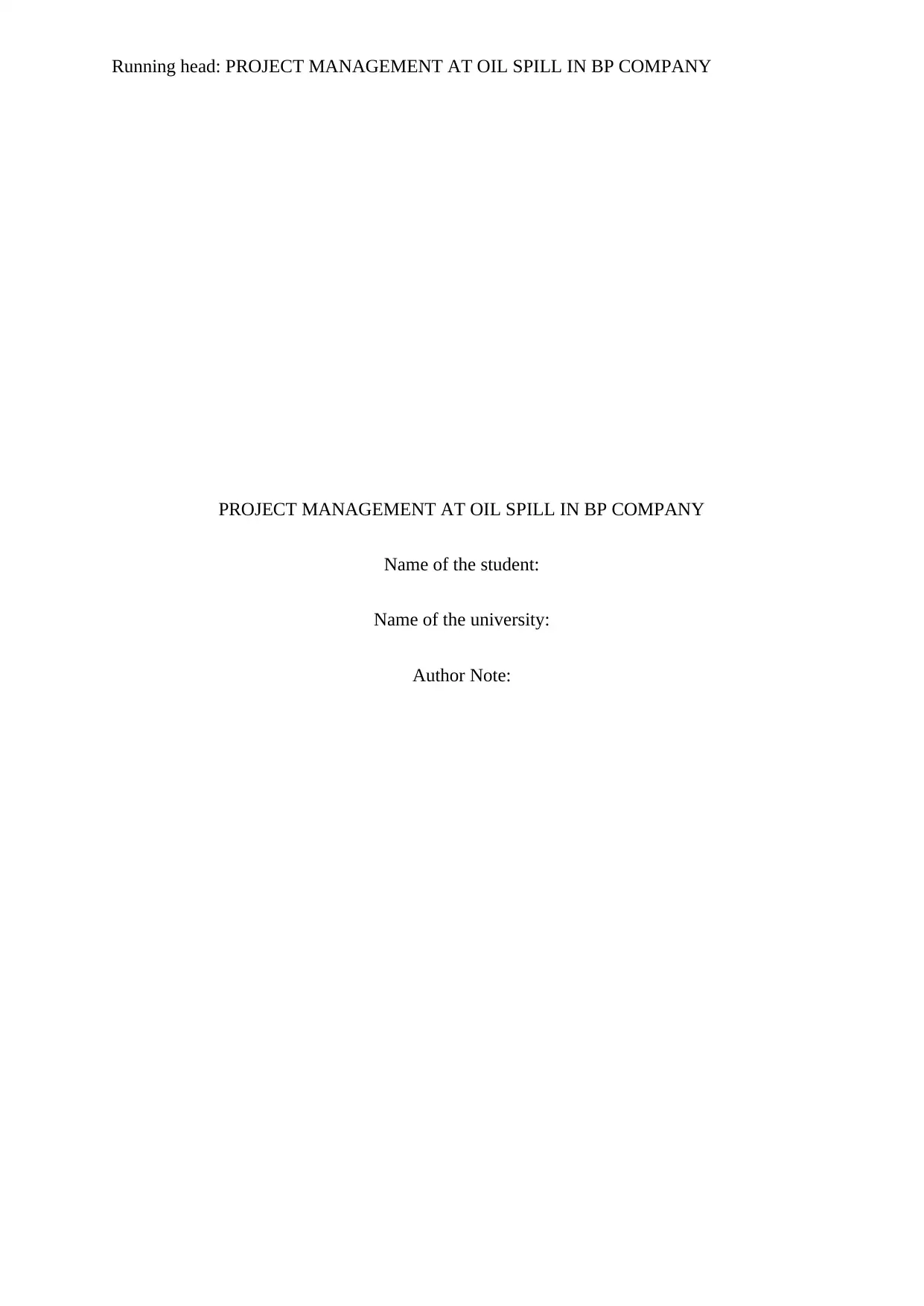
Running head: PROJECT MANAGEMENT AT OIL SPILL IN BP COMPANY
PROJECT MANAGEMENT AT OIL SPILL IN BP COMPANY
Name of the student:
Name of the university:
Author Note:
PROJECT MANAGEMENT AT OIL SPILL IN BP COMPANY
Name of the student:
Name of the university:
Author Note:
Paraphrase This Document
Need a fresh take? Get an instant paraphrase of this document with our AI Paraphraser
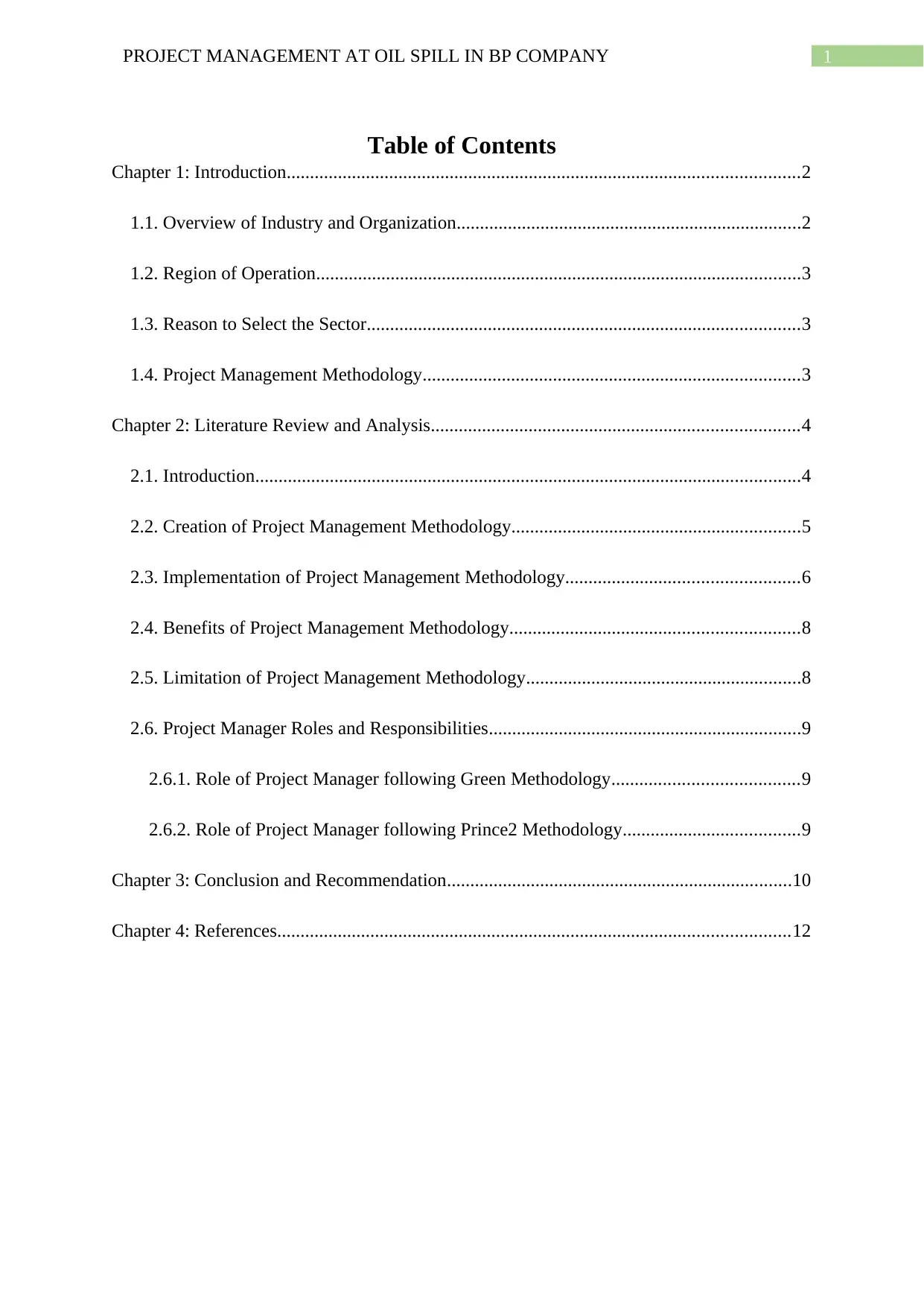
1PROJECT MANAGEMENT AT OIL SPILL IN BP COMPANY
Table of Contents
Chapter 1: Introduction..............................................................................................................2
1.1. Overview of Industry and Organization..........................................................................2
1.2. Region of Operation........................................................................................................3
1.3. Reason to Select the Sector.............................................................................................3
1.4. Project Management Methodology.................................................................................3
Chapter 2: Literature Review and Analysis...............................................................................4
2.1. Introduction.....................................................................................................................4
2.2. Creation of Project Management Methodology..............................................................5
2.3. Implementation of Project Management Methodology..................................................6
2.4. Benefits of Project Management Methodology..............................................................8
2.5. Limitation of Project Management Methodology...........................................................8
2.6. Project Manager Roles and Responsibilities...................................................................9
2.6.1. Role of Project Manager following Green Methodology........................................9
2.6.2. Role of Project Manager following Prince2 Methodology......................................9
Chapter 3: Conclusion and Recommendation..........................................................................10
Chapter 4: References..............................................................................................................12
Table of Contents
Chapter 1: Introduction..............................................................................................................2
1.1. Overview of Industry and Organization..........................................................................2
1.2. Region of Operation........................................................................................................3
1.3. Reason to Select the Sector.............................................................................................3
1.4. Project Management Methodology.................................................................................3
Chapter 2: Literature Review and Analysis...............................................................................4
2.1. Introduction.....................................................................................................................4
2.2. Creation of Project Management Methodology..............................................................5
2.3. Implementation of Project Management Methodology..................................................6
2.4. Benefits of Project Management Methodology..............................................................8
2.5. Limitation of Project Management Methodology...........................................................8
2.6. Project Manager Roles and Responsibilities...................................................................9
2.6.1. Role of Project Manager following Green Methodology........................................9
2.6.2. Role of Project Manager following Prince2 Methodology......................................9
Chapter 3: Conclusion and Recommendation..........................................................................10
Chapter 4: References..............................................................................................................12
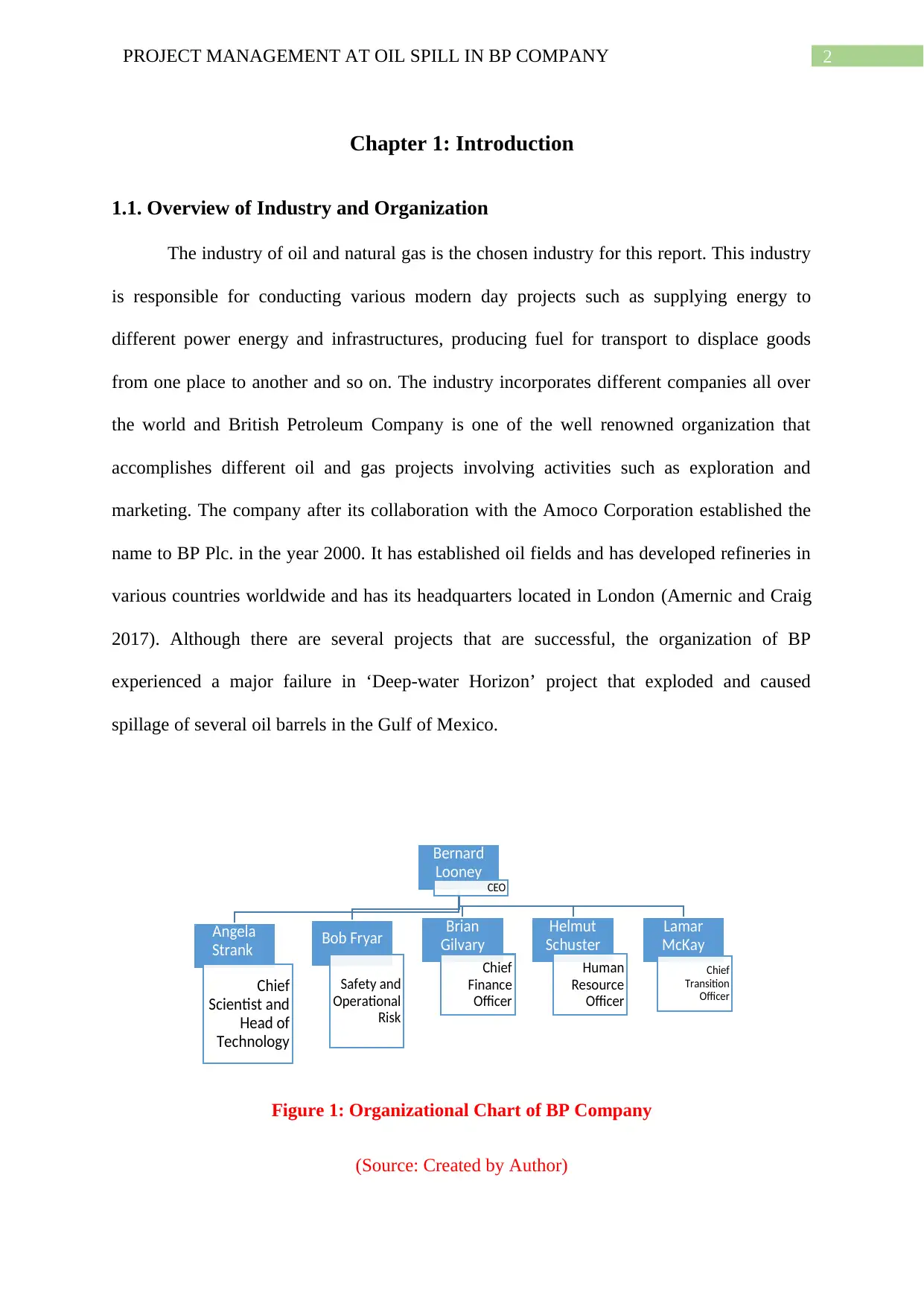
2PROJECT MANAGEMENT AT OIL SPILL IN BP COMPANY
Chapter 1: Introduction
1.1. Overview of Industry and Organization
The industry of oil and natural gas is the chosen industry for this report. This industry
is responsible for conducting various modern day projects such as supplying energy to
different power energy and infrastructures, producing fuel for transport to displace goods
from one place to another and so on. The industry incorporates different companies all over
the world and British Petroleum Company is one of the well renowned organization that
accomplishes different oil and gas projects involving activities such as exploration and
marketing. The company after its collaboration with the Amoco Corporation established the
name to BP Plc. in the year 2000. It has established oil fields and has developed refineries in
various countries worldwide and has its headquarters located in London (Amernic and Craig
2017). Although there are several projects that are successful, the organization of BP
experienced a major failure in ‘Deep-water Horizon’ project that exploded and caused
spillage of several oil barrels in the Gulf of Mexico.
Figure 1: Organizational Chart of BP Company
(Source: Created by Author)
Bernard
Looney CEO
Angela
Strank
Chief
Scientist and
Head of
Technology
Bob Fryar
Safety and
Operational
Risk
Brian
Gilvary
Chief
Finance
Officer
Helmut
Schuster
Human
Resource
Officer
Lamar
McKay
Chief
Transition
Officer
Chapter 1: Introduction
1.1. Overview of Industry and Organization
The industry of oil and natural gas is the chosen industry for this report. This industry
is responsible for conducting various modern day projects such as supplying energy to
different power energy and infrastructures, producing fuel for transport to displace goods
from one place to another and so on. The industry incorporates different companies all over
the world and British Petroleum Company is one of the well renowned organization that
accomplishes different oil and gas projects involving activities such as exploration and
marketing. The company after its collaboration with the Amoco Corporation established the
name to BP Plc. in the year 2000. It has established oil fields and has developed refineries in
various countries worldwide and has its headquarters located in London (Amernic and Craig
2017). Although there are several projects that are successful, the organization of BP
experienced a major failure in ‘Deep-water Horizon’ project that exploded and caused
spillage of several oil barrels in the Gulf of Mexico.
Figure 1: Organizational Chart of BP Company
(Source: Created by Author)
Bernard
Looney CEO
Angela
Strank
Chief
Scientist and
Head of
Technology
Bob Fryar
Safety and
Operational
Risk
Brian
Gilvary
Chief
Finance
Officer
Helmut
Schuster
Human
Resource
Officer
Lamar
McKay
Chief
Transition
Officer
⊘ This is a preview!⊘
Do you want full access?
Subscribe today to unlock all pages.

Trusted by 1+ million students worldwide
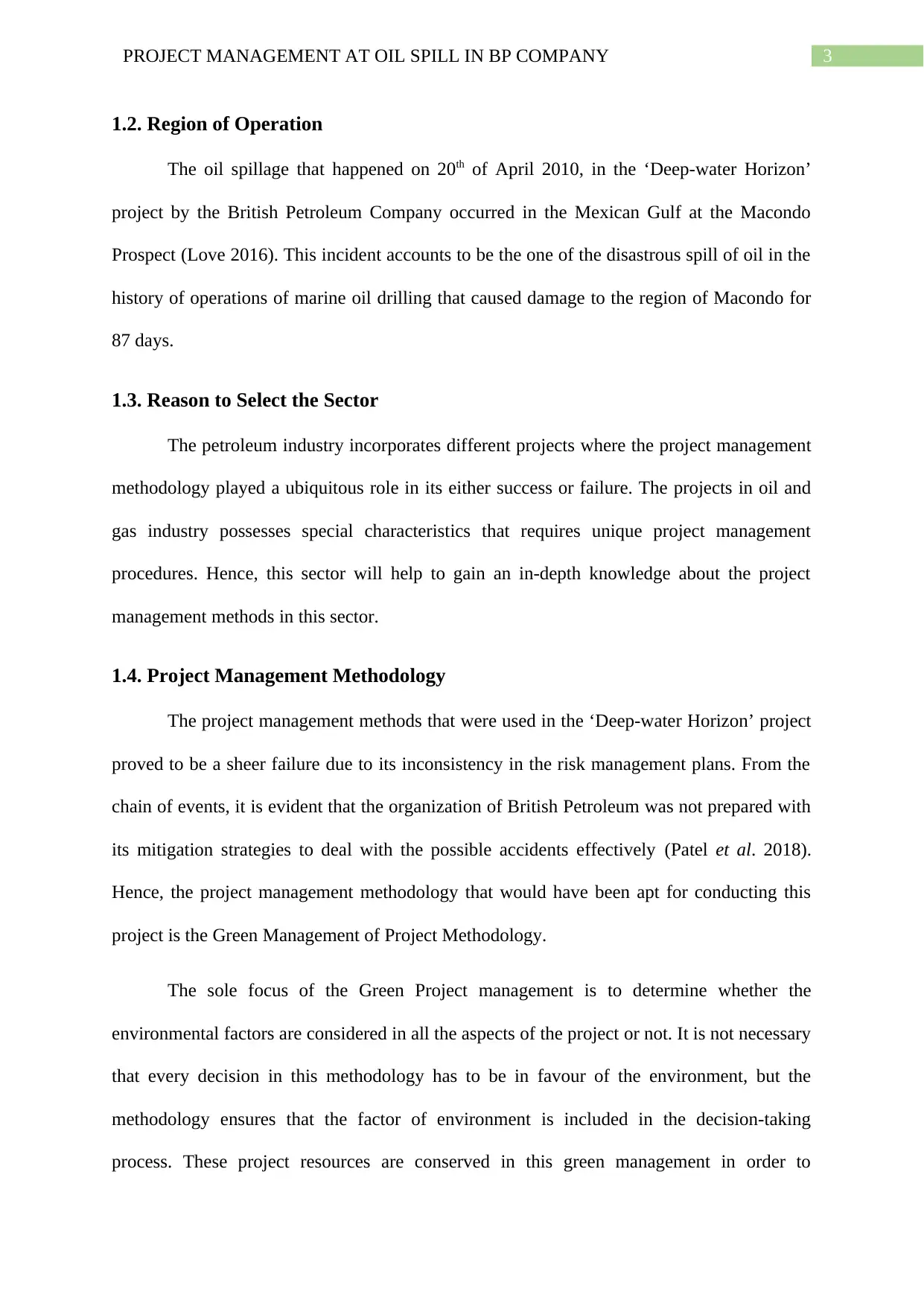
3PROJECT MANAGEMENT AT OIL SPILL IN BP COMPANY
1.2. Region of Operation
The oil spillage that happened on 20th of April 2010, in the ‘Deep-water Horizon’
project by the British Petroleum Company occurred in the Mexican Gulf at the Macondo
Prospect (Love 2016). This incident accounts to be the one of the disastrous spill of oil in the
history of operations of marine oil drilling that caused damage to the region of Macondo for
87 days.
1.3. Reason to Select the Sector
The petroleum industry incorporates different projects where the project management
methodology played a ubiquitous role in its either success or failure. The projects in oil and
gas industry possesses special characteristics that requires unique project management
procedures. Hence, this sector will help to gain an in-depth knowledge about the project
management methods in this sector.
1.4. Project Management Methodology
The project management methods that were used in the ‘Deep-water Horizon’ project
proved to be a sheer failure due to its inconsistency in the risk management plans. From the
chain of events, it is evident that the organization of British Petroleum was not prepared with
its mitigation strategies to deal with the possible accidents effectively (Patel et al. 2018).
Hence, the project management methodology that would have been apt for conducting this
project is the Green Management of Project Methodology.
The sole focus of the Green Project management is to determine whether the
environmental factors are considered in all the aspects of the project or not. It is not necessary
that every decision in this methodology has to be in favour of the environment, but the
methodology ensures that the factor of environment is included in the decision-taking
process. These project resources are conserved in this green management in order to
1.2. Region of Operation
The oil spillage that happened on 20th of April 2010, in the ‘Deep-water Horizon’
project by the British Petroleum Company occurred in the Mexican Gulf at the Macondo
Prospect (Love 2016). This incident accounts to be the one of the disastrous spill of oil in the
history of operations of marine oil drilling that caused damage to the region of Macondo for
87 days.
1.3. Reason to Select the Sector
The petroleum industry incorporates different projects where the project management
methodology played a ubiquitous role in its either success or failure. The projects in oil and
gas industry possesses special characteristics that requires unique project management
procedures. Hence, this sector will help to gain an in-depth knowledge about the project
management methods in this sector.
1.4. Project Management Methodology
The project management methods that were used in the ‘Deep-water Horizon’ project
proved to be a sheer failure due to its inconsistency in the risk management plans. From the
chain of events, it is evident that the organization of British Petroleum was not prepared with
its mitigation strategies to deal with the possible accidents effectively (Patel et al. 2018).
Hence, the project management methodology that would have been apt for conducting this
project is the Green Management of Project Methodology.
The sole focus of the Green Project management is to determine whether the
environmental factors are considered in all the aspects of the project or not. It is not necessary
that every decision in this methodology has to be in favour of the environment, but the
methodology ensures that the factor of environment is included in the decision-taking
process. These project resources are conserved in this green management in order to
Paraphrase This Document
Need a fresh take? Get an instant paraphrase of this document with our AI Paraphraser
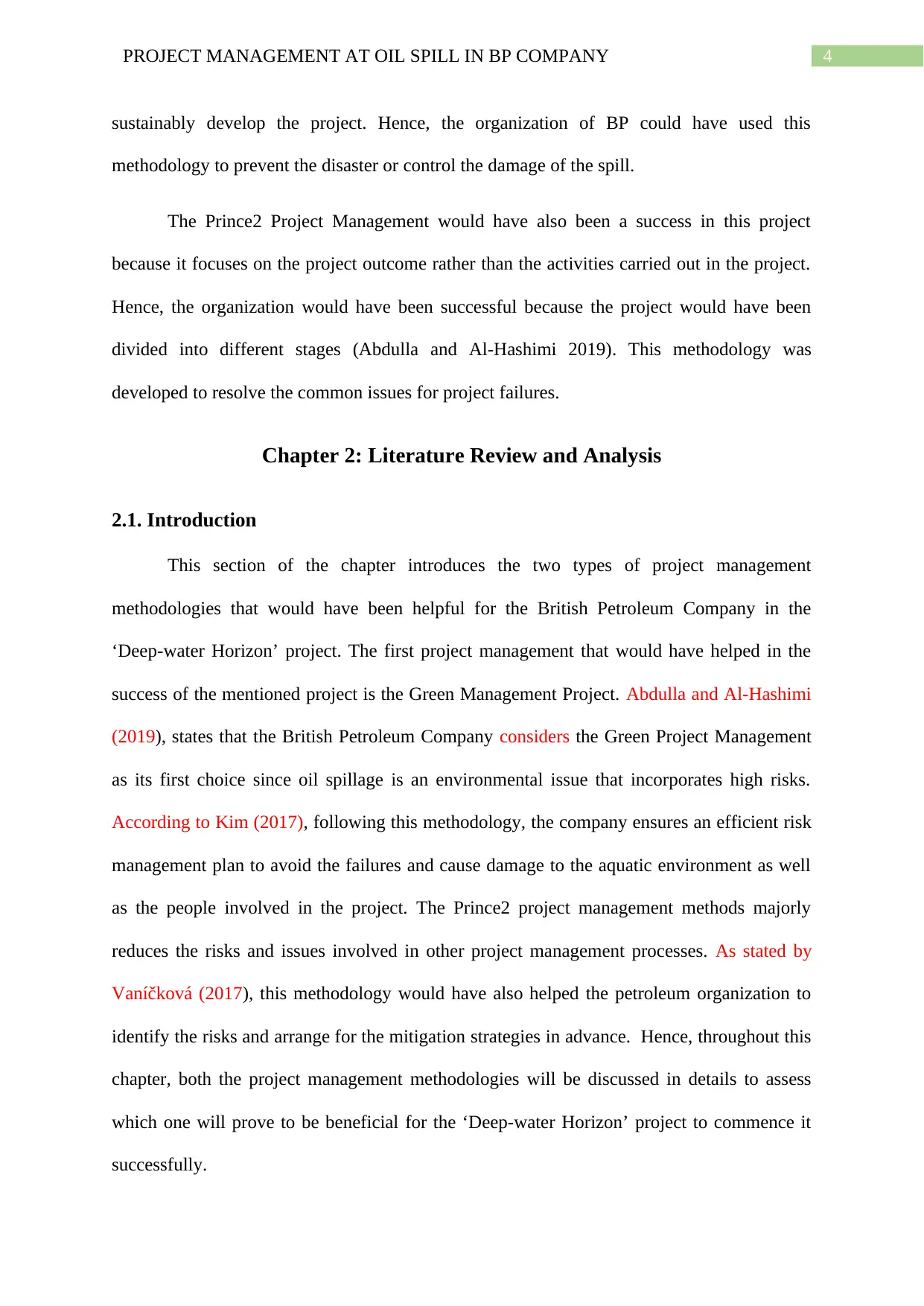
4PROJECT MANAGEMENT AT OIL SPILL IN BP COMPANY
sustainably develop the project. Hence, the organization of BP could have used this
methodology to prevent the disaster or control the damage of the spill.
The Prince2 Project Management would have also been a success in this project
because it focuses on the project outcome rather than the activities carried out in the project.
Hence, the organization would have been successful because the project would have been
divided into different stages (Abdulla and Al-Hashimi 2019). This methodology was
developed to resolve the common issues for project failures.
Chapter 2: Literature Review and Analysis
2.1. Introduction
This section of the chapter introduces the two types of project management
methodologies that would have been helpful for the British Petroleum Company in the
‘Deep-water Horizon’ project. The first project management that would have helped in the
success of the mentioned project is the Green Management Project. Abdulla and Al-Hashimi
(2019), states that the British Petroleum Company considers the Green Project Management
as its first choice since oil spillage is an environmental issue that incorporates high risks.
According to Kim (2017), following this methodology, the company ensures an efficient risk
management plan to avoid the failures and cause damage to the aquatic environment as well
as the people involved in the project. The Prince2 project management methods majorly
reduces the risks and issues involved in other project management processes. As stated by
Vaníčková (2017), this methodology would have also helped the petroleum organization to
identify the risks and arrange for the mitigation strategies in advance. Hence, throughout this
chapter, both the project management methodologies will be discussed in details to assess
which one will prove to be beneficial for the ‘Deep-water Horizon’ project to commence it
successfully.
sustainably develop the project. Hence, the organization of BP could have used this
methodology to prevent the disaster or control the damage of the spill.
The Prince2 Project Management would have also been a success in this project
because it focuses on the project outcome rather than the activities carried out in the project.
Hence, the organization would have been successful because the project would have been
divided into different stages (Abdulla and Al-Hashimi 2019). This methodology was
developed to resolve the common issues for project failures.
Chapter 2: Literature Review and Analysis
2.1. Introduction
This section of the chapter introduces the two types of project management
methodologies that would have been helpful for the British Petroleum Company in the
‘Deep-water Horizon’ project. The first project management that would have helped in the
success of the mentioned project is the Green Management Project. Abdulla and Al-Hashimi
(2019), states that the British Petroleum Company considers the Green Project Management
as its first choice since oil spillage is an environmental issue that incorporates high risks.
According to Kim (2017), following this methodology, the company ensures an efficient risk
management plan to avoid the failures and cause damage to the aquatic environment as well
as the people involved in the project. The Prince2 project management methods majorly
reduces the risks and issues involved in other project management processes. As stated by
Vaníčková (2017), this methodology would have also helped the petroleum organization to
identify the risks and arrange for the mitigation strategies in advance. Hence, throughout this
chapter, both the project management methodologies will be discussed in details to assess
which one will prove to be beneficial for the ‘Deep-water Horizon’ project to commence it
successfully.
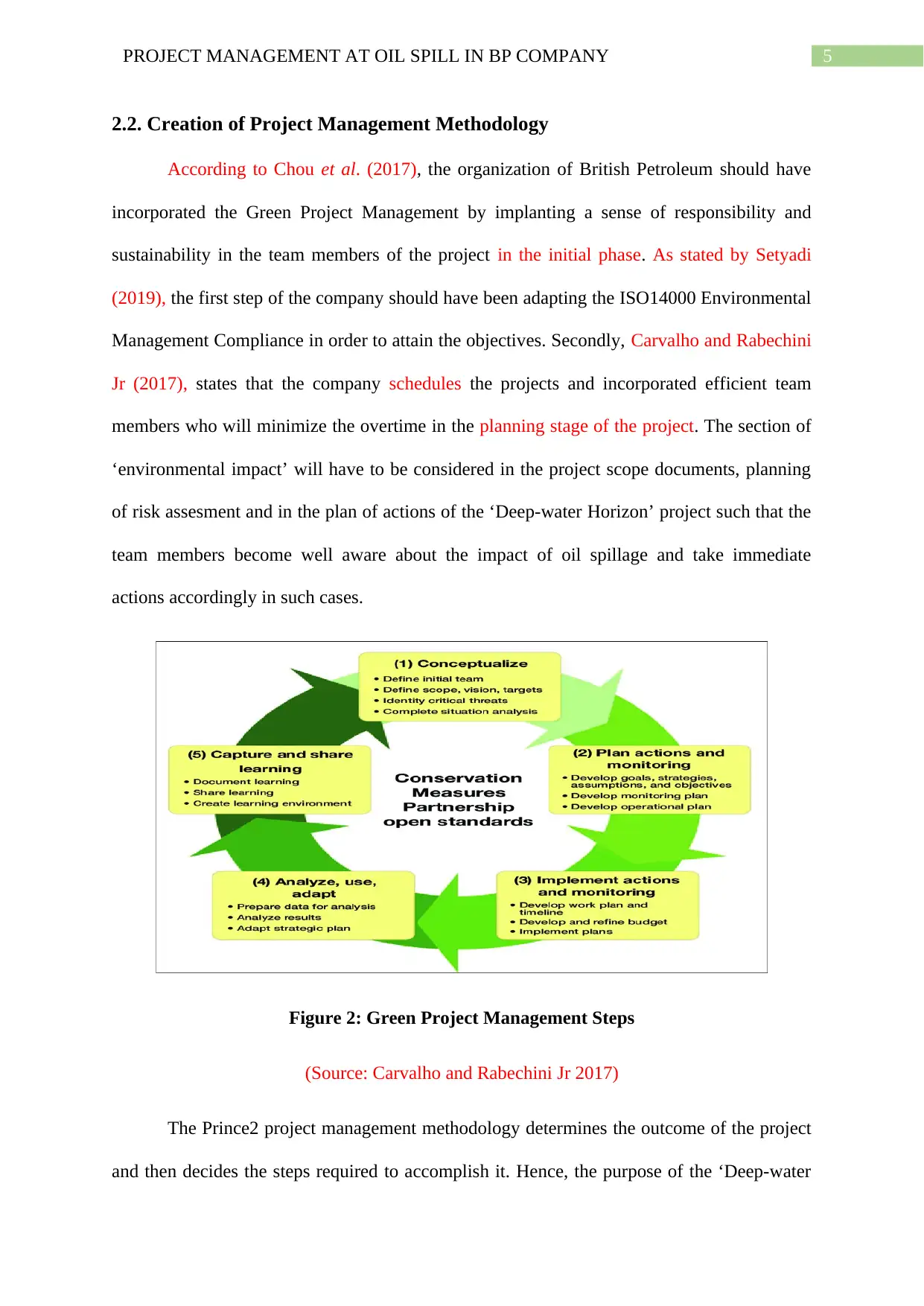
5PROJECT MANAGEMENT AT OIL SPILL IN BP COMPANY
2.2. Creation of Project Management Methodology
According to Chou et al. (2017), the organization of British Petroleum should have
incorporated the Green Project Management by implanting a sense of responsibility and
sustainability in the team members of the project in the initial phase. As stated by Setyadi
(2019), the first step of the company should have been adapting the ISO14000 Environmental
Management Compliance in order to attain the objectives. Secondly, Carvalho and Rabechini
Jr (2017), states that the company schedules the projects and incorporated efficient team
members who will minimize the overtime in the planning stage of the project. The section of
‘environmental impact’ will have to be considered in the project scope documents, planning
of risk assesment and in the plan of actions of the ‘Deep-water Horizon’ project such that the
team members become well aware about the impact of oil spillage and take immediate
actions accordingly in such cases.
Figure 2: Green Project Management Steps
(Source: Carvalho and Rabechini Jr 2017)
The Prince2 project management methodology determines the outcome of the project
and then decides the steps required to accomplish it. Hence, the purpose of the ‘Deep-water
2.2. Creation of Project Management Methodology
According to Chou et al. (2017), the organization of British Petroleum should have
incorporated the Green Project Management by implanting a sense of responsibility and
sustainability in the team members of the project in the initial phase. As stated by Setyadi
(2019), the first step of the company should have been adapting the ISO14000 Environmental
Management Compliance in order to attain the objectives. Secondly, Carvalho and Rabechini
Jr (2017), states that the company schedules the projects and incorporated efficient team
members who will minimize the overtime in the planning stage of the project. The section of
‘environmental impact’ will have to be considered in the project scope documents, planning
of risk assesment and in the plan of actions of the ‘Deep-water Horizon’ project such that the
team members become well aware about the impact of oil spillage and take immediate
actions accordingly in such cases.
Figure 2: Green Project Management Steps
(Source: Carvalho and Rabechini Jr 2017)
The Prince2 project management methodology determines the outcome of the project
and then decides the steps required to accomplish it. Hence, the purpose of the ‘Deep-water
⊘ This is a preview!⊘
Do you want full access?
Subscribe today to unlock all pages.

Trusted by 1+ million students worldwide
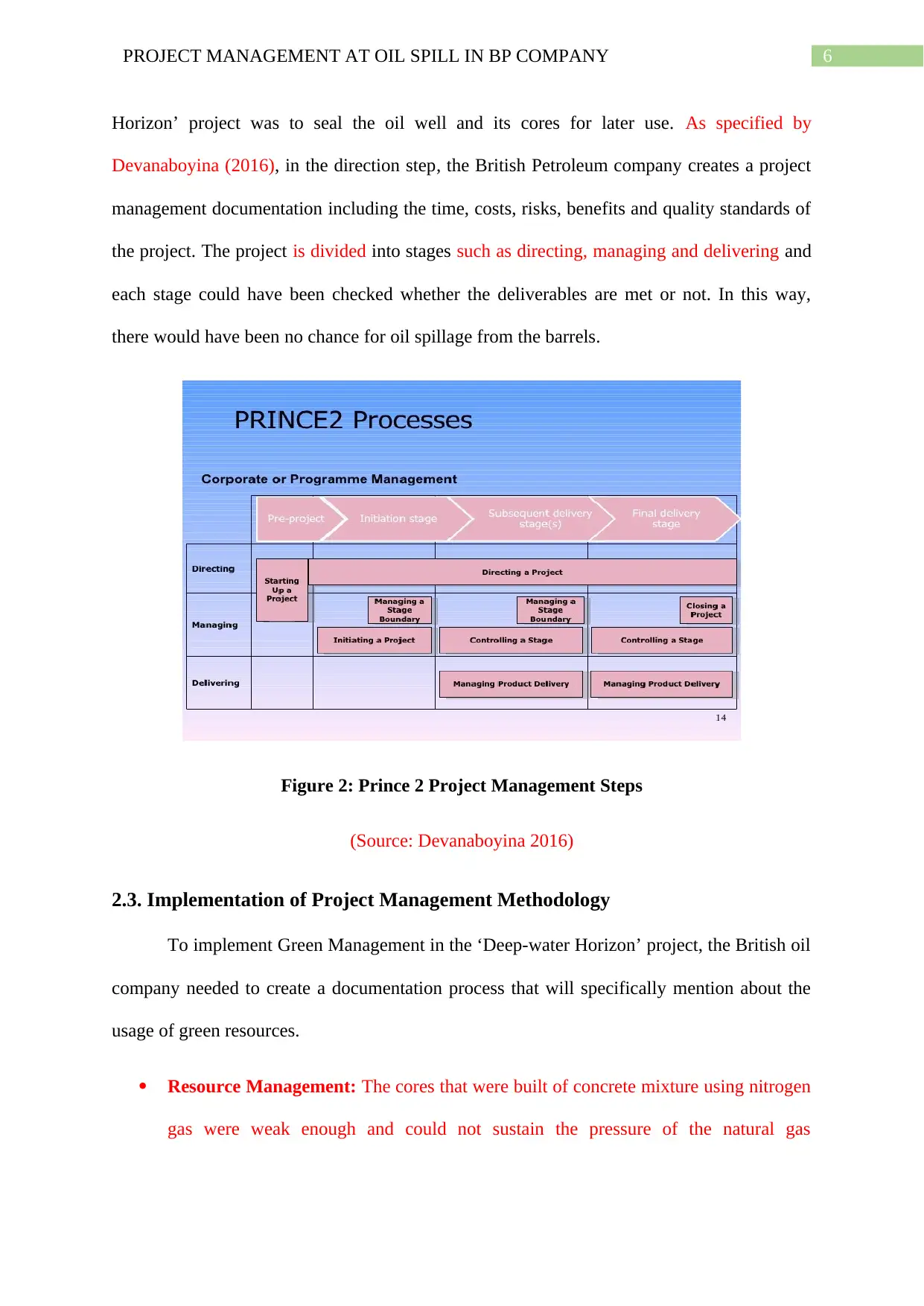
6PROJECT MANAGEMENT AT OIL SPILL IN BP COMPANY
Horizon’ project was to seal the oil well and its cores for later use. As specified by
Devanaboyina (2016), in the direction step, the British Petroleum company creates a project
management documentation including the time, costs, risks, benefits and quality standards of
the project. The project is divided into stages such as directing, managing and delivering and
each stage could have been checked whether the deliverables are met or not. In this way,
there would have been no chance for oil spillage from the barrels.
Figure 2: Prince 2 Project Management Steps
(Source: Devanaboyina 2016)
2.3. Implementation of Project Management Methodology
To implement Green Management in the ‘Deep-water Horizon’ project, the British oil
company needed to create a documentation process that will specifically mention about the
usage of green resources.
Resource Management: The cores that were built of concrete mixture using nitrogen
gas were weak enough and could not sustain the pressure of the natural gas
Horizon’ project was to seal the oil well and its cores for later use. As specified by
Devanaboyina (2016), in the direction step, the British Petroleum company creates a project
management documentation including the time, costs, risks, benefits and quality standards of
the project. The project is divided into stages such as directing, managing and delivering and
each stage could have been checked whether the deliverables are met or not. In this way,
there would have been no chance for oil spillage from the barrels.
Figure 2: Prince 2 Project Management Steps
(Source: Devanaboyina 2016)
2.3. Implementation of Project Management Methodology
To implement Green Management in the ‘Deep-water Horizon’ project, the British oil
company needed to create a documentation process that will specifically mention about the
usage of green resources.
Resource Management: The cores that were built of concrete mixture using nitrogen
gas were weak enough and could not sustain the pressure of the natural gas
Paraphrase This Document
Need a fresh take? Get an instant paraphrase of this document with our AI Paraphraser
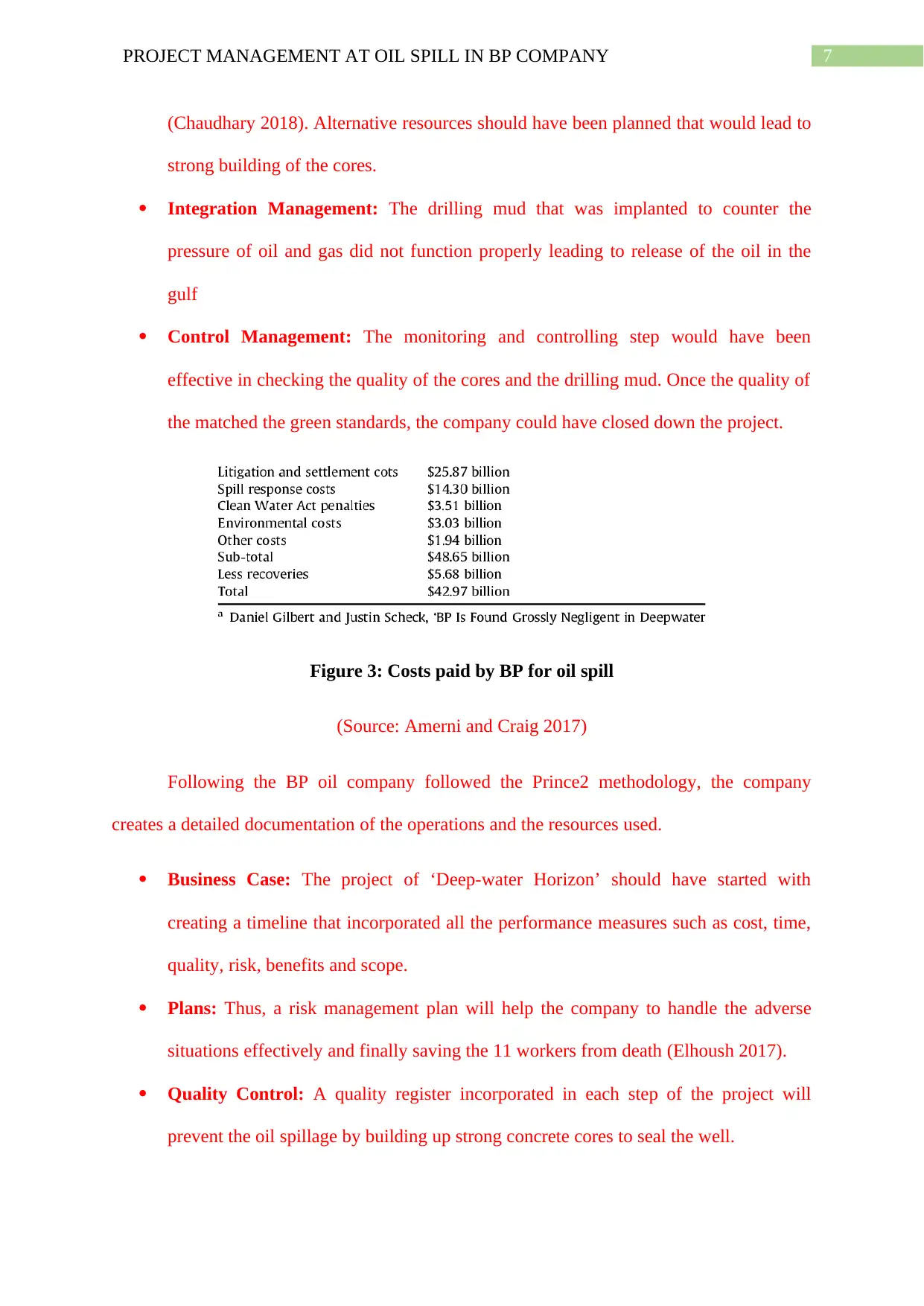
7PROJECT MANAGEMENT AT OIL SPILL IN BP COMPANY
(Chaudhary 2018). Alternative resources should have been planned that would lead to
strong building of the cores.
Integration Management: The drilling mud that was implanted to counter the
pressure of oil and gas did not function properly leading to release of the oil in the
gulf
Control Management: The monitoring and controlling step would have been
effective in checking the quality of the cores and the drilling mud. Once the quality of
the matched the green standards, the company could have closed down the project.
Figure 3: Costs paid by BP for oil spill
(Source: Amerni and Craig 2017)
Following the BP oil company followed the Prince2 methodology, the company
creates a detailed documentation of the operations and the resources used.
Business Case: The project of ‘Deep-water Horizon’ should have started with
creating a timeline that incorporated all the performance measures such as cost, time,
quality, risk, benefits and scope.
Plans: Thus, a risk management plan will help the company to handle the adverse
situations effectively and finally saving the 11 workers from death (Elhoush 2017).
Quality Control: A quality register incorporated in each step of the project will
prevent the oil spillage by building up strong concrete cores to seal the well.
(Chaudhary 2018). Alternative resources should have been planned that would lead to
strong building of the cores.
Integration Management: The drilling mud that was implanted to counter the
pressure of oil and gas did not function properly leading to release of the oil in the
gulf
Control Management: The monitoring and controlling step would have been
effective in checking the quality of the cores and the drilling mud. Once the quality of
the matched the green standards, the company could have closed down the project.
Figure 3: Costs paid by BP for oil spill
(Source: Amerni and Craig 2017)
Following the BP oil company followed the Prince2 methodology, the company
creates a detailed documentation of the operations and the resources used.
Business Case: The project of ‘Deep-water Horizon’ should have started with
creating a timeline that incorporated all the performance measures such as cost, time,
quality, risk, benefits and scope.
Plans: Thus, a risk management plan will help the company to handle the adverse
situations effectively and finally saving the 11 workers from death (Elhoush 2017).
Quality Control: A quality register incorporated in each step of the project will
prevent the oil spillage by building up strong concrete cores to seal the well.
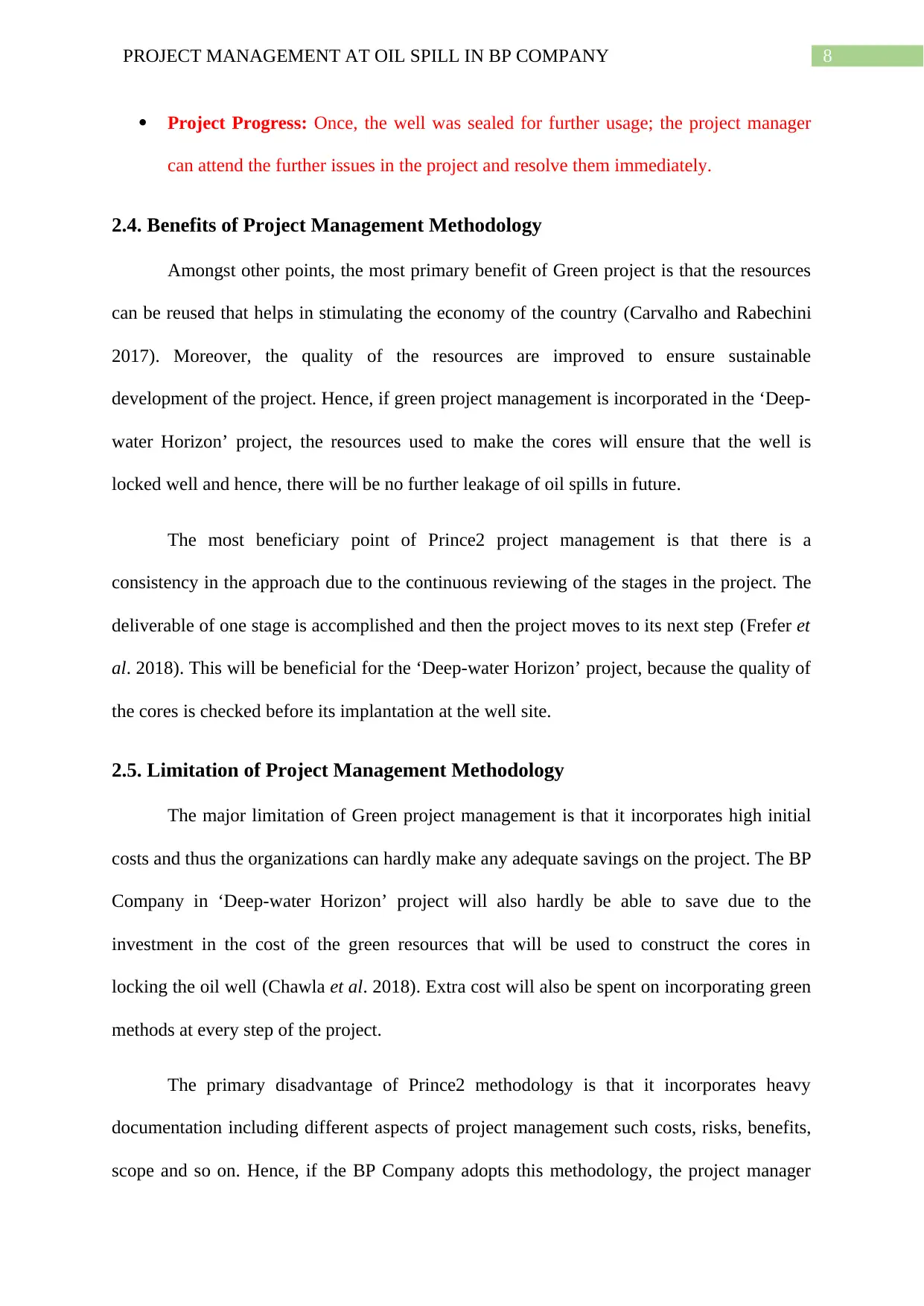
8PROJECT MANAGEMENT AT OIL SPILL IN BP COMPANY
Project Progress: Once, the well was sealed for further usage; the project manager
can attend the further issues in the project and resolve them immediately.
2.4. Benefits of Project Management Methodology
Amongst other points, the most primary benefit of Green project is that the resources
can be reused that helps in stimulating the economy of the country (Carvalho and Rabechini
2017). Moreover, the quality of the resources are improved to ensure sustainable
development of the project. Hence, if green project management is incorporated in the ‘Deep-
water Horizon’ project, the resources used to make the cores will ensure that the well is
locked well and hence, there will be no further leakage of oil spills in future.
The most beneficiary point of Prince2 project management is that there is a
consistency in the approach due to the continuous reviewing of the stages in the project. The
deliverable of one stage is accomplished and then the project moves to its next step (Frefer et
al. 2018). This will be beneficial for the ‘Deep-water Horizon’ project, because the quality of
the cores is checked before its implantation at the well site.
2.5. Limitation of Project Management Methodology
The major limitation of Green project management is that it incorporates high initial
costs and thus the organizations can hardly make any adequate savings on the project. The BP
Company in ‘Deep-water Horizon’ project will also hardly be able to save due to the
investment in the cost of the green resources that will be used to construct the cores in
locking the oil well (Chawla et al. 2018). Extra cost will also be spent on incorporating green
methods at every step of the project.
The primary disadvantage of Prince2 methodology is that it incorporates heavy
documentation including different aspects of project management such costs, risks, benefits,
scope and so on. Hence, if the BP Company adopts this methodology, the project manager
Project Progress: Once, the well was sealed for further usage; the project manager
can attend the further issues in the project and resolve them immediately.
2.4. Benefits of Project Management Methodology
Amongst other points, the most primary benefit of Green project is that the resources
can be reused that helps in stimulating the economy of the country (Carvalho and Rabechini
2017). Moreover, the quality of the resources are improved to ensure sustainable
development of the project. Hence, if green project management is incorporated in the ‘Deep-
water Horizon’ project, the resources used to make the cores will ensure that the well is
locked well and hence, there will be no further leakage of oil spills in future.
The most beneficiary point of Prince2 project management is that there is a
consistency in the approach due to the continuous reviewing of the stages in the project. The
deliverable of one stage is accomplished and then the project moves to its next step (Frefer et
al. 2018). This will be beneficial for the ‘Deep-water Horizon’ project, because the quality of
the cores is checked before its implantation at the well site.
2.5. Limitation of Project Management Methodology
The major limitation of Green project management is that it incorporates high initial
costs and thus the organizations can hardly make any adequate savings on the project. The BP
Company in ‘Deep-water Horizon’ project will also hardly be able to save due to the
investment in the cost of the green resources that will be used to construct the cores in
locking the oil well (Chawla et al. 2018). Extra cost will also be spent on incorporating green
methods at every step of the project.
The primary disadvantage of Prince2 methodology is that it incorporates heavy
documentation including different aspects of project management such costs, risks, benefits,
scope and so on. Hence, if the BP Company adopts this methodology, the project manager
⊘ This is a preview!⊘
Do you want full access?
Subscribe today to unlock all pages.

Trusted by 1+ million students worldwide
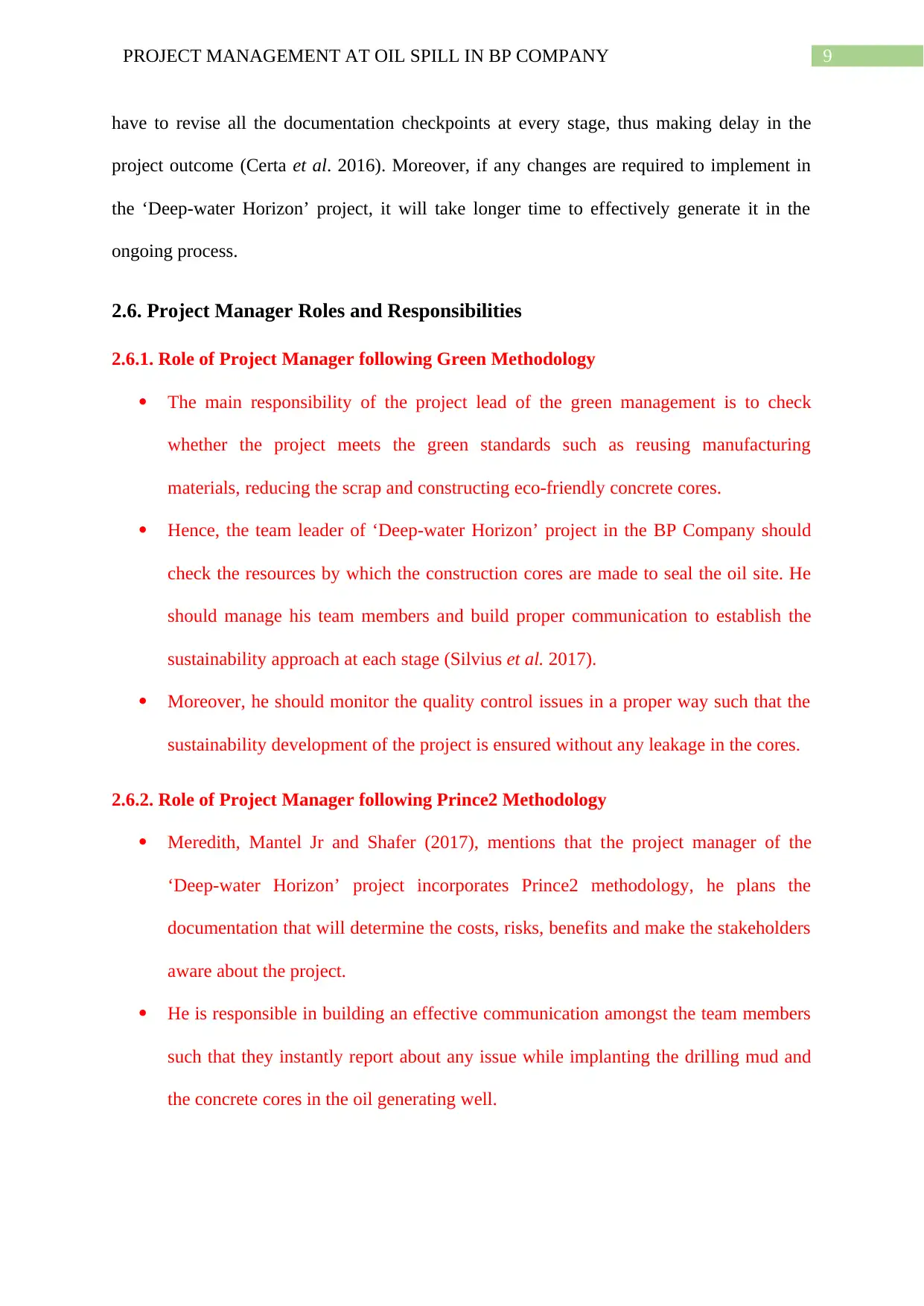
9PROJECT MANAGEMENT AT OIL SPILL IN BP COMPANY
have to revise all the documentation checkpoints at every stage, thus making delay in the
project outcome (Certa et al. 2016). Moreover, if any changes are required to implement in
the ‘Deep-water Horizon’ project, it will take longer time to effectively generate it in the
ongoing process.
2.6. Project Manager Roles and Responsibilities
2.6.1. Role of Project Manager following Green Methodology
The main responsibility of the project lead of the green management is to check
whether the project meets the green standards such as reusing manufacturing
materials, reducing the scrap and constructing eco-friendly concrete cores.
Hence, the team leader of ‘Deep-water Horizon’ project in the BP Company should
check the resources by which the construction cores are made to seal the oil site. He
should manage his team members and build proper communication to establish the
sustainability approach at each stage (Silvius et al. 2017).
Moreover, he should monitor the quality control issues in a proper way such that the
sustainability development of the project is ensured without any leakage in the cores.
2.6.2. Role of Project Manager following Prince2 Methodology
Meredith, Mantel Jr and Shafer (2017), mentions that the project manager of the
‘Deep-water Horizon’ project incorporates Prince2 methodology, he plans the
documentation that will determine the costs, risks, benefits and make the stakeholders
aware about the project.
He is responsible in building an effective communication amongst the team members
such that they instantly report about any issue while implanting the drilling mud and
the concrete cores in the oil generating well.
have to revise all the documentation checkpoints at every stage, thus making delay in the
project outcome (Certa et al. 2016). Moreover, if any changes are required to implement in
the ‘Deep-water Horizon’ project, it will take longer time to effectively generate it in the
ongoing process.
2.6. Project Manager Roles and Responsibilities
2.6.1. Role of Project Manager following Green Methodology
The main responsibility of the project lead of the green management is to check
whether the project meets the green standards such as reusing manufacturing
materials, reducing the scrap and constructing eco-friendly concrete cores.
Hence, the team leader of ‘Deep-water Horizon’ project in the BP Company should
check the resources by which the construction cores are made to seal the oil site. He
should manage his team members and build proper communication to establish the
sustainability approach at each stage (Silvius et al. 2017).
Moreover, he should monitor the quality control issues in a proper way such that the
sustainability development of the project is ensured without any leakage in the cores.
2.6.2. Role of Project Manager following Prince2 Methodology
Meredith, Mantel Jr and Shafer (2017), mentions that the project manager of the
‘Deep-water Horizon’ project incorporates Prince2 methodology, he plans the
documentation that will determine the costs, risks, benefits and make the stakeholders
aware about the project.
He is responsible in building an effective communication amongst the team members
such that they instantly report about any issue while implanting the drilling mud and
the concrete cores in the oil generating well.
Paraphrase This Document
Need a fresh take? Get an instant paraphrase of this document with our AI Paraphraser
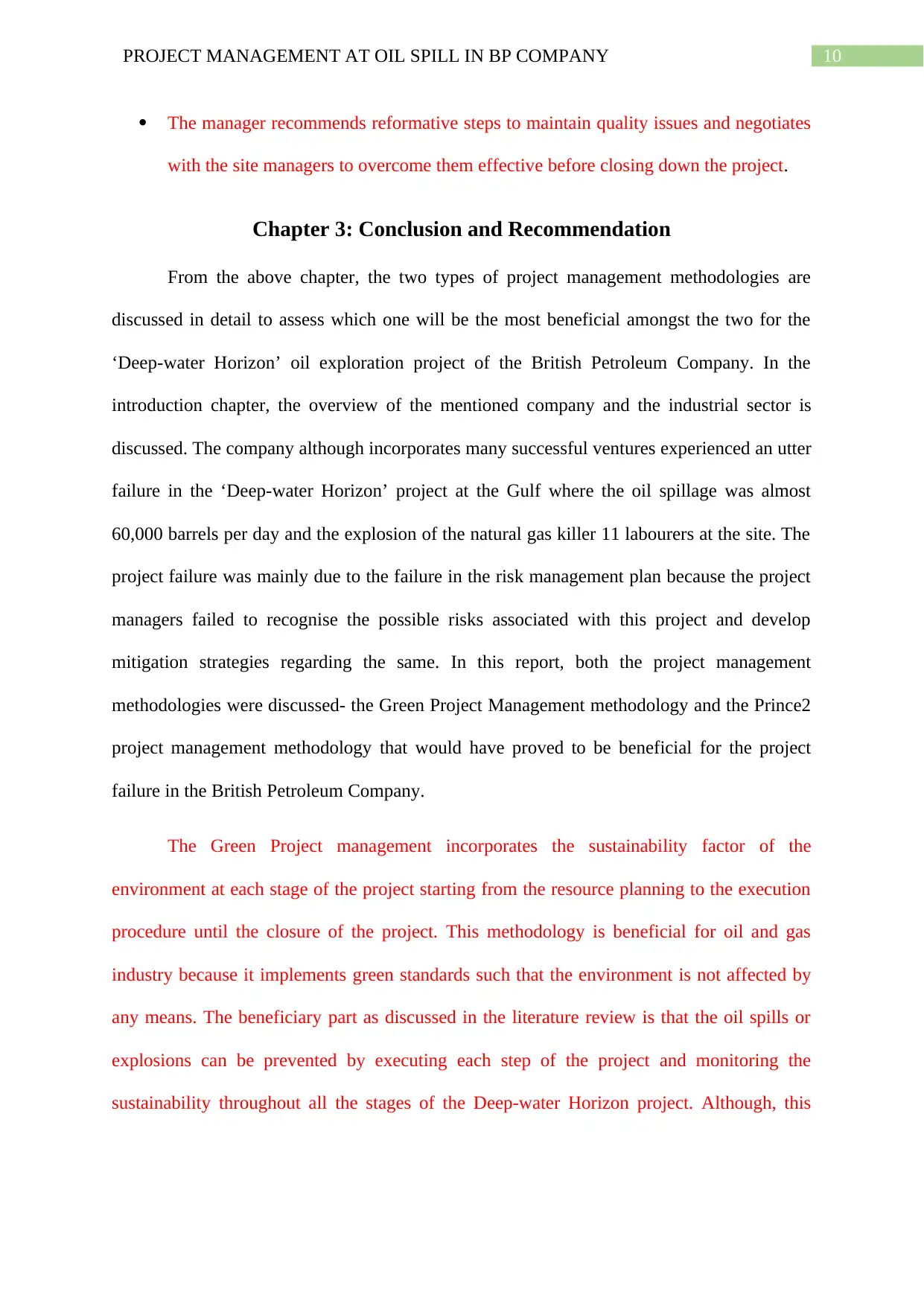
10PROJECT MANAGEMENT AT OIL SPILL IN BP COMPANY
The manager recommends reformative steps to maintain quality issues and negotiates
with the site managers to overcome them effective before closing down the project.
Chapter 3: Conclusion and Recommendation
From the above chapter, the two types of project management methodologies are
discussed in detail to assess which one will be the most beneficial amongst the two for the
‘Deep-water Horizon’ oil exploration project of the British Petroleum Company. In the
introduction chapter, the overview of the mentioned company and the industrial sector is
discussed. The company although incorporates many successful ventures experienced an utter
failure in the ‘Deep-water Horizon’ project at the Gulf where the oil spillage was almost
60,000 barrels per day and the explosion of the natural gas killer 11 labourers at the site. The
project failure was mainly due to the failure in the risk management plan because the project
managers failed to recognise the possible risks associated with this project and develop
mitigation strategies regarding the same. In this report, both the project management
methodologies were discussed- the Green Project Management methodology and the Prince2
project management methodology that would have proved to be beneficial for the project
failure in the British Petroleum Company.
The Green Project management incorporates the sustainability factor of the
environment at each stage of the project starting from the resource planning to the execution
procedure until the closure of the project. This methodology is beneficial for oil and gas
industry because it implements green standards such that the environment is not affected by
any means. The beneficiary part as discussed in the literature review is that the oil spills or
explosions can be prevented by executing each step of the project and monitoring the
sustainability throughout all the stages of the Deep-water Horizon project. Although, this
The manager recommends reformative steps to maintain quality issues and negotiates
with the site managers to overcome them effective before closing down the project.
Chapter 3: Conclusion and Recommendation
From the above chapter, the two types of project management methodologies are
discussed in detail to assess which one will be the most beneficial amongst the two for the
‘Deep-water Horizon’ oil exploration project of the British Petroleum Company. In the
introduction chapter, the overview of the mentioned company and the industrial sector is
discussed. The company although incorporates many successful ventures experienced an utter
failure in the ‘Deep-water Horizon’ project at the Gulf where the oil spillage was almost
60,000 barrels per day and the explosion of the natural gas killer 11 labourers at the site. The
project failure was mainly due to the failure in the risk management plan because the project
managers failed to recognise the possible risks associated with this project and develop
mitigation strategies regarding the same. In this report, both the project management
methodologies were discussed- the Green Project Management methodology and the Prince2
project management methodology that would have proved to be beneficial for the project
failure in the British Petroleum Company.
The Green Project management incorporates the sustainability factor of the
environment at each stage of the project starting from the resource planning to the execution
procedure until the closure of the project. This methodology is beneficial for oil and gas
industry because it implements green standards such that the environment is not affected by
any means. The beneficiary part as discussed in the literature review is that the oil spills or
explosions can be prevented by executing each step of the project and monitoring the
sustainability throughout all the stages of the Deep-water Horizon project. Although, this
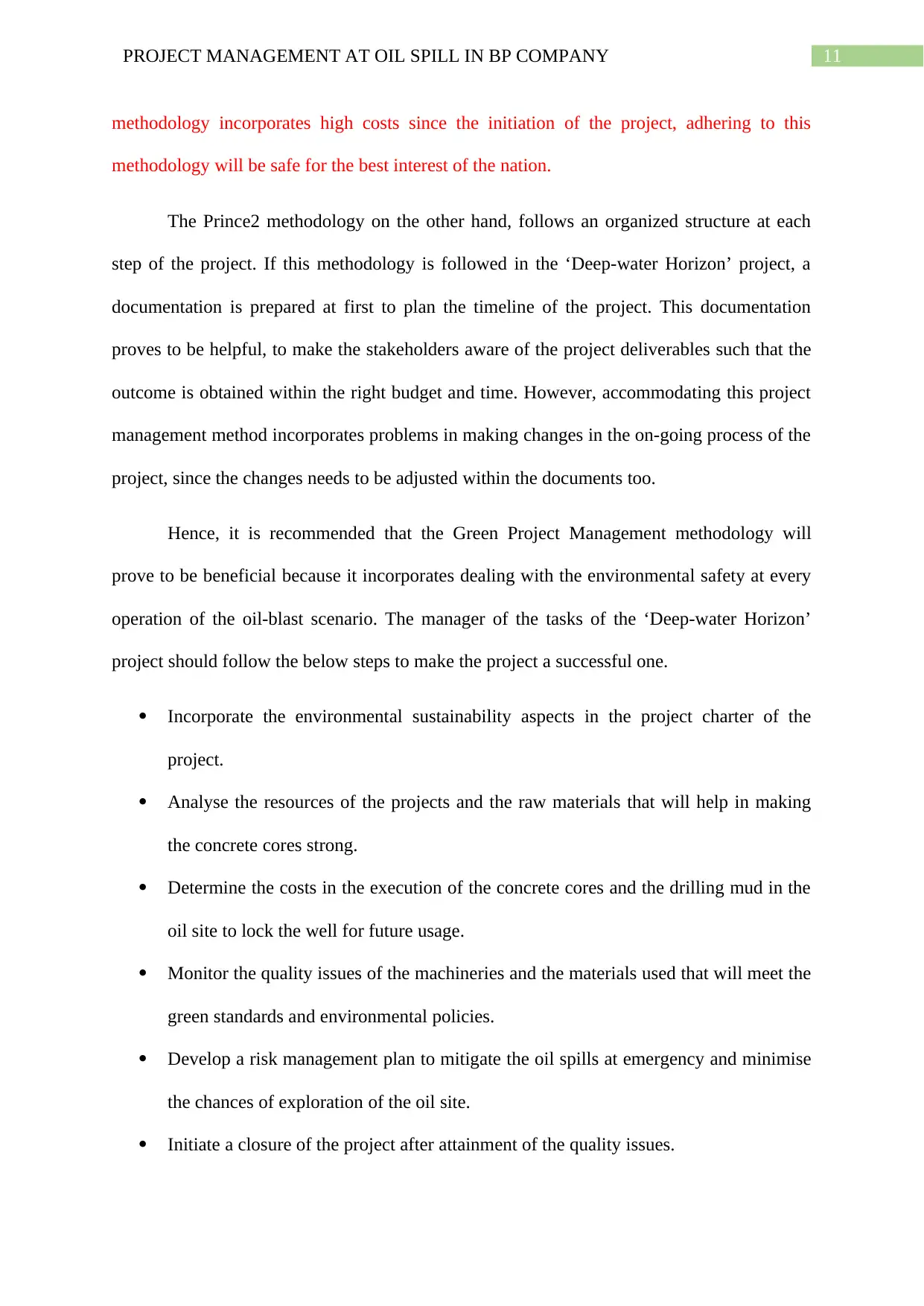
11PROJECT MANAGEMENT AT OIL SPILL IN BP COMPANY
methodology incorporates high costs since the initiation of the project, adhering to this
methodology will be safe for the best interest of the nation.
The Prince2 methodology on the other hand, follows an organized structure at each
step of the project. If this methodology is followed in the ‘Deep-water Horizon’ project, a
documentation is prepared at first to plan the timeline of the project. This documentation
proves to be helpful, to make the stakeholders aware of the project deliverables such that the
outcome is obtained within the right budget and time. However, accommodating this project
management method incorporates problems in making changes in the on-going process of the
project, since the changes needs to be adjusted within the documents too.
Hence, it is recommended that the Green Project Management methodology will
prove to be beneficial because it incorporates dealing with the environmental safety at every
operation of the oil-blast scenario. The manager of the tasks of the ‘Deep-water Horizon’
project should follow the below steps to make the project a successful one.
Incorporate the environmental sustainability aspects in the project charter of the
project.
Analyse the resources of the projects and the raw materials that will help in making
the concrete cores strong.
Determine the costs in the execution of the concrete cores and the drilling mud in the
oil site to lock the well for future usage.
Monitor the quality issues of the machineries and the materials used that will meet the
green standards and environmental policies.
Develop a risk management plan to mitigate the oil spills at emergency and minimise
the chances of exploration of the oil site.
Initiate a closure of the project after attainment of the quality issues.
methodology incorporates high costs since the initiation of the project, adhering to this
methodology will be safe for the best interest of the nation.
The Prince2 methodology on the other hand, follows an organized structure at each
step of the project. If this methodology is followed in the ‘Deep-water Horizon’ project, a
documentation is prepared at first to plan the timeline of the project. This documentation
proves to be helpful, to make the stakeholders aware of the project deliverables such that the
outcome is obtained within the right budget and time. However, accommodating this project
management method incorporates problems in making changes in the on-going process of the
project, since the changes needs to be adjusted within the documents too.
Hence, it is recommended that the Green Project Management methodology will
prove to be beneficial because it incorporates dealing with the environmental safety at every
operation of the oil-blast scenario. The manager of the tasks of the ‘Deep-water Horizon’
project should follow the below steps to make the project a successful one.
Incorporate the environmental sustainability aspects in the project charter of the
project.
Analyse the resources of the projects and the raw materials that will help in making
the concrete cores strong.
Determine the costs in the execution of the concrete cores and the drilling mud in the
oil site to lock the well for future usage.
Monitor the quality issues of the machineries and the materials used that will meet the
green standards and environmental policies.
Develop a risk management plan to mitigate the oil spills at emergency and minimise
the chances of exploration of the oil site.
Initiate a closure of the project after attainment of the quality issues.
⊘ This is a preview!⊘
Do you want full access?
Subscribe today to unlock all pages.

Trusted by 1+ million students worldwide
1 out of 15
Related Documents
Your All-in-One AI-Powered Toolkit for Academic Success.
+13062052269
info@desklib.com
Available 24*7 on WhatsApp / Email
![[object Object]](/_next/static/media/star-bottom.7253800d.svg)
Unlock your academic potential
Copyright © 2020–2026 A2Z Services. All Rights Reserved. Developed and managed by ZUCOL.





